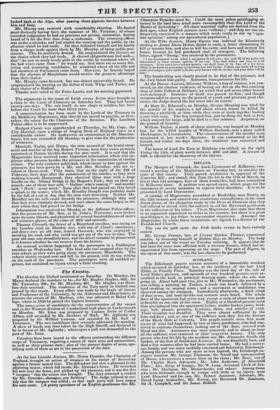At the last Lincoln Assizes, Mr. Henry Dymoke, the Champion
of England, brought an action of trespass on his manor of Scrivelsby against a farmer named Goe. the defendant had shot a pheasant in the adjoining manor, which fell inside Mr. Dymoke's fence. He stretched his arm over the fence, and picked up the pheasant, and it was for this " trespass " that the action was brought. The Jury returned a verdict for Mr. Dymoke—damages, one farthing ! The Judge refused to cer- tify that the trespass was wilful; so that each party will have tospay his own costs. [A pretty specimen of an English gentleman this Mr.
Champion Dymoke must be. Could the most paltry pettifogging at- torney in the land have acted more contemptibly than this Lord of the Manor of Scrivelsby ? All these manorial rights are derived from the dark ages, when English yeomen were "villeins ;" and they are not Un- frequently exercised in a manner which tends vastly to stir up agra-
rian agitation" among our agricultural population.] •
At the Wilts Assizes, Henry Herren was indicted for feloniously sending to James Davis Home, dealer in coals, a letter threatening to kill or murder him, and also to kill his cattle and burn and destroy his house, because he had purchased coals of strangers. The following letter, signed "Swing," was received by the prosecutor. " am determined to do what I am going to tell you : me, and 93 of my party are determined to have reform, quietly if we can. You had better not buy co Is of strangers. If we can't have reform quietly, we shall have it by loss or a few lives. There is no harm in poisoning or shooting you and Tailor. Unless you leave off buying lost.."
of strangers, your cattle will die, your houses will be on fire, and your lives silt be
The handwriting was clearly proved to be that of the prisoner, and the Jury found him guilty. Sentence, transportation for life.
At the Dorset Assizes, Silvester Wilkins, a boy of sixteen, was con- • victed, on the clearest evidence, of having set fire to the flax-combing shop of John Follett.at Bridport, by which that and seven other houses were destroyed. Sentence of death was passed on him ; and though recommended to mercy on the ground of youth and previous good cha- racter, the Judge feared the law must take its course.
At Bury St. Edmund's, on Monday, George Shearing was tried for the murder of his - nephew, a lad about eleven, whom he killed by throwing a pitchfork at him, while they were at work together loading a cart with corn. The boy.irritated him, and be flung. the fork at him, which entered.his lungs, and he died in a-few minutes. Acquitted, on the ground of insanity.
William Taylor, a youth of about nineteen, was hanged on Monday last, for the wilful murder of William Burbank, near a place called Heekington, in Lincolnshire. The circumstances Of the murder were mentioned in last week's Spectator. It was committed on the 9th instant, and within ten days after, the murderer was cobvieted and hanged. The house of Lord De Roos at Brighton was robbed, on the night Friday the 15th, of plate worth between 400/. and 500/: A reward of 100/. is offered for the discovery of the thieves.




















 Previous page
Previous page